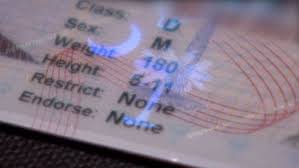Can police track you with a fake ID
Can Police Track You with a Fake ID?
The use of fake IDs has become more prevalent in recent years, raising the question: can police track you with a fake ID? The short answer is yes, but the methods and technologies involved are more complex than you might think. Police use a variety of tools to detect and track individuals using fake IDs, and understanding these techniques can help explain how law enforcement deals with this issue.

What Is a Fake ID?
A fake ID is a fraudulent form of identification. These can range from poor-quality, homemade IDs to professionally produced counterfeit documents that closely mimic government-issued identification cards. Fake IDs are most commonly associated with underage individuals trying to gain access to places restricted by age, such as bars and clubs. However, fake IDs are also used in more serious crimes, including fraud, identity theft, and illegal immigration.
How Can Police Detect Fake IDs?
Law enforcement agencies have become increasingly sophisticated in detecting and tracking fake IDs. Some common techniques include:
Advanced Scanning Technology: Many bars, clubs, and police departments now use ID scanners that cross-check the ID with a national database. If the ID doesn't match the information in the system, it’s flagged as suspicious.
Facial Recognition: Police can use facial recognition technology to match the person presenting the fake ID with existing databases, even if the name and details on the ID are false. This can lead to immediate identification.
Data Analytics: Law enforcement agencies also utilize data analytics to track patterns of fake ID usage. For example, if multiple fake IDs originate from the same source, they may be able to trace the network producing these IDs.
Tracking Individuals with Fake IDs
Once a fake ID has been detected, the police may use various methods to track the person. These methods include:
Social Media and Online Activity: Police can sometimes link the fake ID to online profiles and social media accounts. Many individuals who use fake IDs might also post on platforms like Instagram, Facebook, or Twitter, which could give away their identity.
Mobile Data Tracking: If the fake ID is used in connection with a mobile phone, police can track the phone number or device through various technological means, including triangulation and geolocation services.
Transaction Monitoring: In some cases, police may track individuals through the credit or debit card transactions associated with the fake ID. Using a fake ID to make purchases or open bank accounts can leave a paper trail.
Legal Consequences of Using a Fake ID
If you are caught using a fake ID, the legal consequences can be severe. The punishment largely depends on how the fake ID is used. For example, using a fake ID to buy alcohol might result in a fine, while using one for identity theft or fraud could lead to imprisonment. The penalties often increase if the fake ID is connected to a larger criminal network.
How to Avoid Being Tracked When Using a Fake ID
While it may seem tempting to try to avoid detection, the reality is that police have many tools at their disposal to track down individuals using fake IDs. Technologies like AI, biometric scanners, and enhanced database integration have made it easier than ever to catch people committing identity fraud.
It's also important to note that ID verification tools are improving at a fast pace. New government initiatives, such as the introduction of Real ID in the United States, make it harder to create believable counterfeit documents.
Conclusion
Can police track you with a fake ID? Absolutely. The tools available to law enforcement, ranging from facial recognition to mobile data tracking, make it difficult to avoid detection. Furthermore, the penalties for being caught using a fake ID can be harsh. Given the advancements in technology and the legal consequences, using a fake ID is a risky endeavor.
Related Keywords and Long-Tail Keywords
- Fake ID detection
- Facial recognition for ID verification
- Tracking fake ID users
- Consequences of using fake identification
- How police catch fake ID users
- Mobile tracking of fake ID holders
- ID scanning technology
- Credit card fraud with fake IDs
- Social media tracking with fake ID
- How do police find fake IDs?
 MissouriFake ID
MissouriFake ID
 UtahFake ID
UtahFake ID
 New YorkFake ID
New YorkFake ID
 MinnesotaFake ID
MinnesotaFake ID